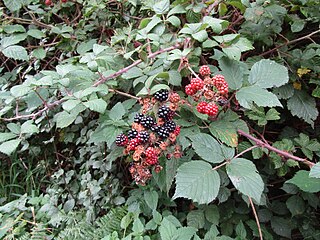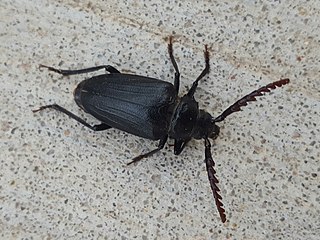In computer science, an integer is a datum of integral data type, a data type that represents some range of mathematical integers. Integral data types may be of different sizes and may or may not be allowed to contain negative values. Integers are commonly represented in a computer as a group of binary digits (bits). The size of the grouping varies so the set of integer sizes available varies between different types of computers. Computer hardware nearly always provides a way to represent a processor register or memory address as an integer.

An embryo is the initial stage of development for a multicellular organism. In organisms that reproduce sexually, embryonic development is the part of the life cycle that begins just after fertilization of the female egg cell by the male sperm cell. The resulting fusion of these two cells produces a single-celled zygote that undergoes many cell divisions that produce cells known as blastomeres. The blastomeres are arranged as a solid ball that when reaching a certain size, called a morula, takes in fluid to create a cavity called a blastocoel. The structure is then termed a blastula, or a blastocyst in mammals.

In computing, endianness is the order in which bytes within a word of digital data are transmitted over a data communication medium or addressed in computer memory, counting only byte significance compared to earliness. Endianness is primarily expressed as big-endian (BE) or little-endian (LE), terms introduced by Danny Cohen into computer science for data ordering in an Internet Experiment Note published in 1980. The adjective endian has its origin in the writings of 18th century Anglo-Irish writer Jonathan Swift. In the 1726 novel Gulliver's Travels, he portrays the conflict between sects of Lilliputians divided into those breaking the shell of a boiled egg from the big end or from the little end. By analogy, a CPU may read a digital word big end first, or little end first.

Rubus is a large and diverse genus of flowering plants in the rose family, Rosaceae, subfamily Rosoideae, commonly known as brambles. Fruits of various species are known as raspberries, blackberries, dewberries, and bristleberries. It is a diverse genus, with the estimated number of Rubus species varying from 250 to over 1000, found across all continents except Antarctica.

Convolvulaceae, commonly called the bindweeds or morning glories, is a family of about 60 genera and more than 1,650 species. These species are primarily herbaceous vines, but also include trees, shrubs and herbs. The tubers of several species are edible, the best known of which is the sweet potato.

Nyctaginaceae, the four o'clock family, is a family of around 33 genera and 290 species of flowering plants, widely distributed in tropical and subtropical regions, with a few representatives in temperate regions. The family has a distinctive fruit type called an accessory fruit or anthocarp, and many genera have extremely large pollen grains.

Science, technology, engineering, and mathematics (STEM) is an umbrella term used to group together the distinct but related technical disciplines of science, technology, engineering, and mathematics. The term is typically used in the context of education policy or curriculum choices in schools. It has implications for workforce development, national security concerns, and immigration policy, with regard to admitting foreign students and tech workers.
XSB is the name of a dialect of the Prolog programming language and its implementation developed at Stony Brook University in collaboration with the Katholieke Universiteit Leuven, the New University of Lisbon, Uppsala University and software vendor XSB, Inc.
Secure coding is the practice of developing computer software in such a way that guards against the accidental introduction of security vulnerabilities. Defects, bugs and logic flaws are consistently the primary cause of commonly exploited software vulnerabilities. Through the analysis of thousands of reported vulnerabilities, security professionals have discovered that most vulnerabilities stem from a relatively small number of common software programming errors. By identifying the insecure coding practices that lead to these errors and educating developers on secure alternatives, organizations can take proactive steps to help significantly reduce or eliminate vulnerabilities in software before deployment.
888 is the natural number following 887 and preceding 889.
A Janus kinase inhibitor, also known as JAK inhibitor or jakinib, is a type of immune modulating medication, which inhibits the activity of one or more of the Janus kinase family of enzymes, thereby interfering with the JAK-STAT signaling pathway in lymphocytes.

Cephidae is a family of stem sawflies in the order Hymenoptera. There are about 27 genera and more than 160 described species in Cephidae.
Conotrachelus integer is a species of true weevil in the beetle family Curculionidae. It is found in North America.

Galerita janus is a species of ground beetle in the family Carabidae. It is found in North America.
Parapsammodius is a genus of aphodiine dung beetles in the family Scarabaeidae. There are at least four described species in Parapsammodius.
Janus is a genus of stem sawflies in the family Cephidae. There are about five described species in Janus.

Prionus integer is a species of long-horned beetle in the family Cerambycidae. It is endemic to the United States.

Cryptophilus is a genus of pleasing fungus beetles in the family Erotylidae. There are about nine described species in Cryptophilus.

Cryptophilus integer is a species of pleasing fungus beetle in the family Erotylidae. It is found in Australia, Europe and Northern Asia, North America, and Oceania.
Sosippus janus is a species of wolf spider in the family Lycosidae. It is found in the United States.









